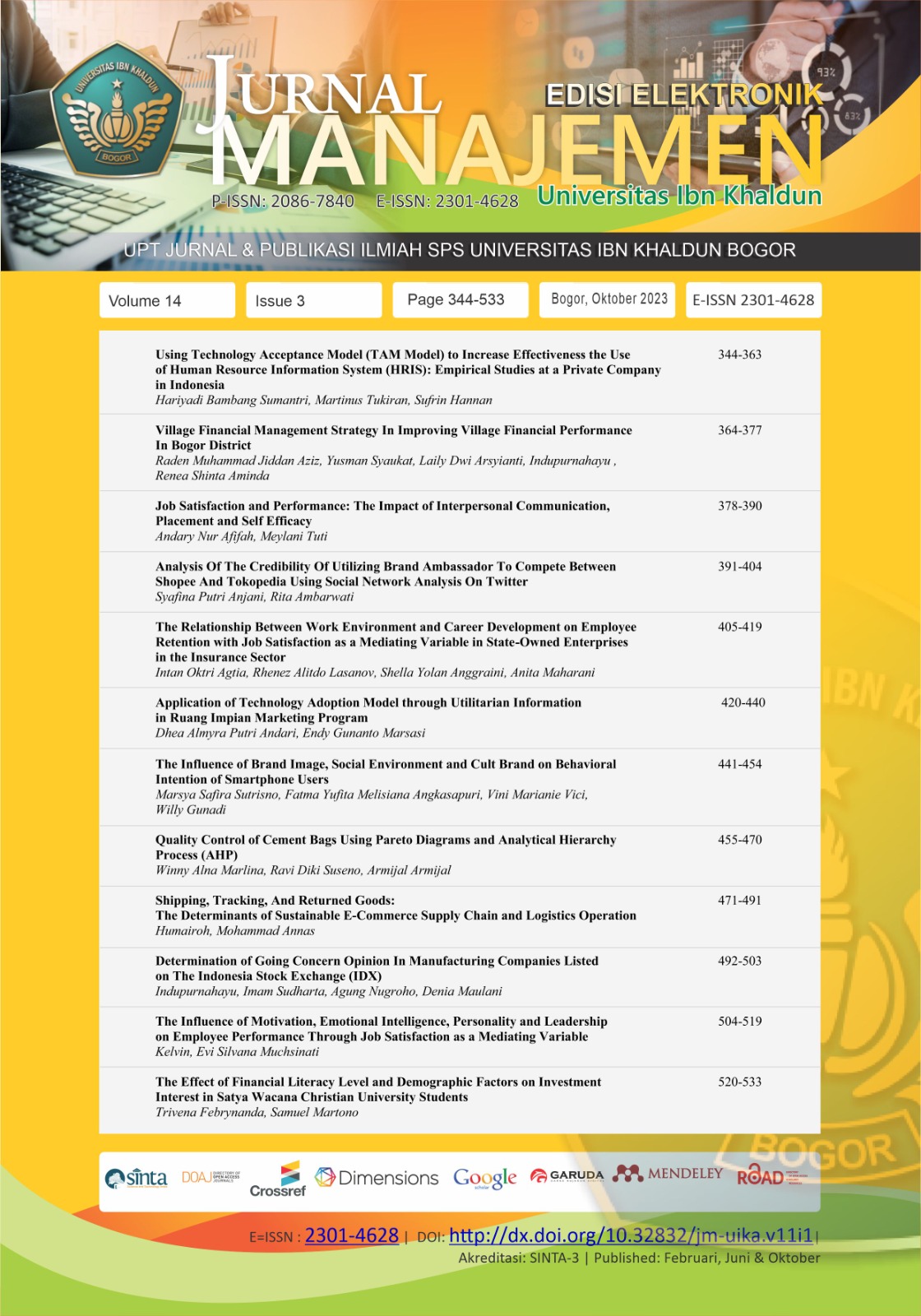Village Financial Management Strategy in Improving Village Financial Performance in Bogor District
Management Finance Village
DOI:
https://doi.org/10.32832/jm-uika.v14i3.14331Keywords:
Finance, Performance Finance, VillageAbstract
Development changes village for 10 years experience a very rapid increases with the birth of law number 6 of 2014 about village, but Corruption cases in Indonesia are still very high, especially in Bogor Regency there was a case of arrest of the Bogor Regency Regent, 7 reports of misuse of village funds and 1 arrest of the village head who was proven to be a suspect in corruption in village financial management, the existence of this case will affect the village's assessment, especially in its financial performance requires good management in managing finances in order to create good governance, therefore the purpose of this study is the arrangement of village financial management, data processing methods using the Analytical Hierarchy Process (AHP) with a profusive sampling sample including 7 expert judgments to assess strategy, results This research is based on the dominating criterion, namely planning that must be improved, on the sub-criteria, namely village financial independence, and on the alternative strategy chosen, namely strengthening the quality of human resources and regulations, then carrying out managerial implications by strengthening the quadruple helix model approach between the government, academics/experts, business, and society.
References
Agam, M. (2019). Anti Korupsi. https://doi.org/3218327182
Aminah, S., & Prasetyo, H. (2018). Analisis Tingkat Kapasitas Aparatur Pemerintah Desa di Kabupaten Bogor. Matra Pembaruan, 2(3), 149–160. https://doi.org/10.21787/mp.2.3.2018.149-160
Copeland, T. E., Weston, J. F., & Shastri, K. (2014). Financial theory and corporate policy / Thomas Copeland, J. Fred Weston, Kuldeep Shastri. In Pearson New International Edition. https://www.pearson-studium.de/9781292034812
Dungga, W. A., Tome, A. H., & Moha, A. (2017). PENERAPAN PRINSIP GOOD GOVERNANCE DALAM TATA KELOLA PEMERINTAHAN DESA. ILMIAH HUKUM, Volume 11. https://doi.org/1410-8763
Ekaningtias, D. (2022). The Role of Competence, Culture, and Socio-spiritual Factors in the Implementation of the Village Financial System. The Indonesian Accounting Review, 12(1), 41. https://doi.org/10.14414/tiar.v12i1.2476
Falatehan AF. (2016). Analytical Hierarchy Process (AHP) Teknik Pengambilan Keputusan Untuk Pembangunan Daerah, Edisi Pertama (Pertama). Indomedia Pustaka.
Indonesia Corruption Watch. (2021). Aparat Desa Paling Korup di Indonesia. (n.d.). Retrieved November 30. https://www.cnnindonesia.com/nasional/20210912162748-12-693206/icw%02tahun-2021-aparat-desa-paling-korup-di-indonesia.
Kapoor, N., Ahmad, N., Nayak, S. K., Singh, S. P., Ilavarasan, P. V., & Ramamoorthy, P. (2021). Identifying infrastructural gap areas for smart and sustainable tribal village development: A data science approach from India. International Journal of Information Management Data Insights, 1(2), 100041. https://doi.org/10.1016/j.jjimei.2021.100041
Kemenkeu. (2017). Manajemen Keuangan Desa.
Laya, K. A. (2021). Evaluasi dan Perumusan Strategi Pengelolaan Dana Desa di Kabupaten Bogor. In Jurnal Manajemen Agribisnis (Vol. 9, Issue 1).
Pamungkas, T. K., & Rosyanfikri, R. (2021). Analisis Penerapan Prinsip-Prinsip Good Governance dalam Pelaksanaan Pemerintahan Desa. Jurnal Paradigma Madani, 8(2), 36–45. http://ejurnal.uij.ac.id/index.php/PAR/article/view/1126
Santosa. (2018). Good Governance.
Seputro, H. Y., Wahyuningsih, S. D., & Sunrowiyati, S. (2017). Potensi Fraud Dan Strategi Anti Fraud Pengelolaan Keuangan Desa. Jurnal Penelitian Teori & Terapan Akuntansi (PETA), 2(1), 79–93. https://doi.org/10.51289/peta.v2i1.284
Triganda, R. (2018). Pengaruh Pertumbuhan Ekonomi, Pendapatan Asli Daerah, Dana Alokasi Umum, dan Dana Bagi Hasil Terhadap Tingkat Kemandirian Keuangan Daerah Pada Pemerintahan Kabupaten/Kota di Provinsi Riau Tahun 2012-2015. http://repositori.usu.ac.id/handle/123456789/6699
Zulkarnaen, W., Fitriani, I. D., & ... (2020). Pengembangan Supply Chain Management Dalam Pengelolaan Distribusi Logistik Pemilu Yang Lebih Tepat Jenis, Tepat Jumlah Dan Tepat Waktu Berbasis Human. … Ilmiah MEA (Manajemen …, 4(June), 222–243. http://www.journal.stiemb.ac.id/index.php/mea/article/view/372
Downloads
Published
How to Cite
Issue
Section
License
Copyright (c) 2023 Jurnal Manajemen (Edisi Elektronik)

This work is licensed under a Creative Commons Attribution-NonCommercial 4.0 International License.
Authors who publish with this journal agree to the following terms:
- Authors retain copyright and grant the journal right of first publication with the work simultaneously licensed under a Creative Commons Attribution-NonCommercial-ShareAlike 4.0 International License that allows others to share the work with an acknowledgement of the work's authorship and initial publication in this journal.
- Authors can enter into separate, additional contractual arrangements for the non-exclusive distribution of the journal's published version of the work (e.g., post it to an institutional repository or publish it in a book), with an acknowledgement of its initial publication in this journal.
- Authors are permitted and encouraged to post their work online (e.g., in institutional repositories or on their website) prior to and during the submission process, as it can lead to productive exchanges, as well as earlier and greater citation of published work (See The Effect of Open Access).











